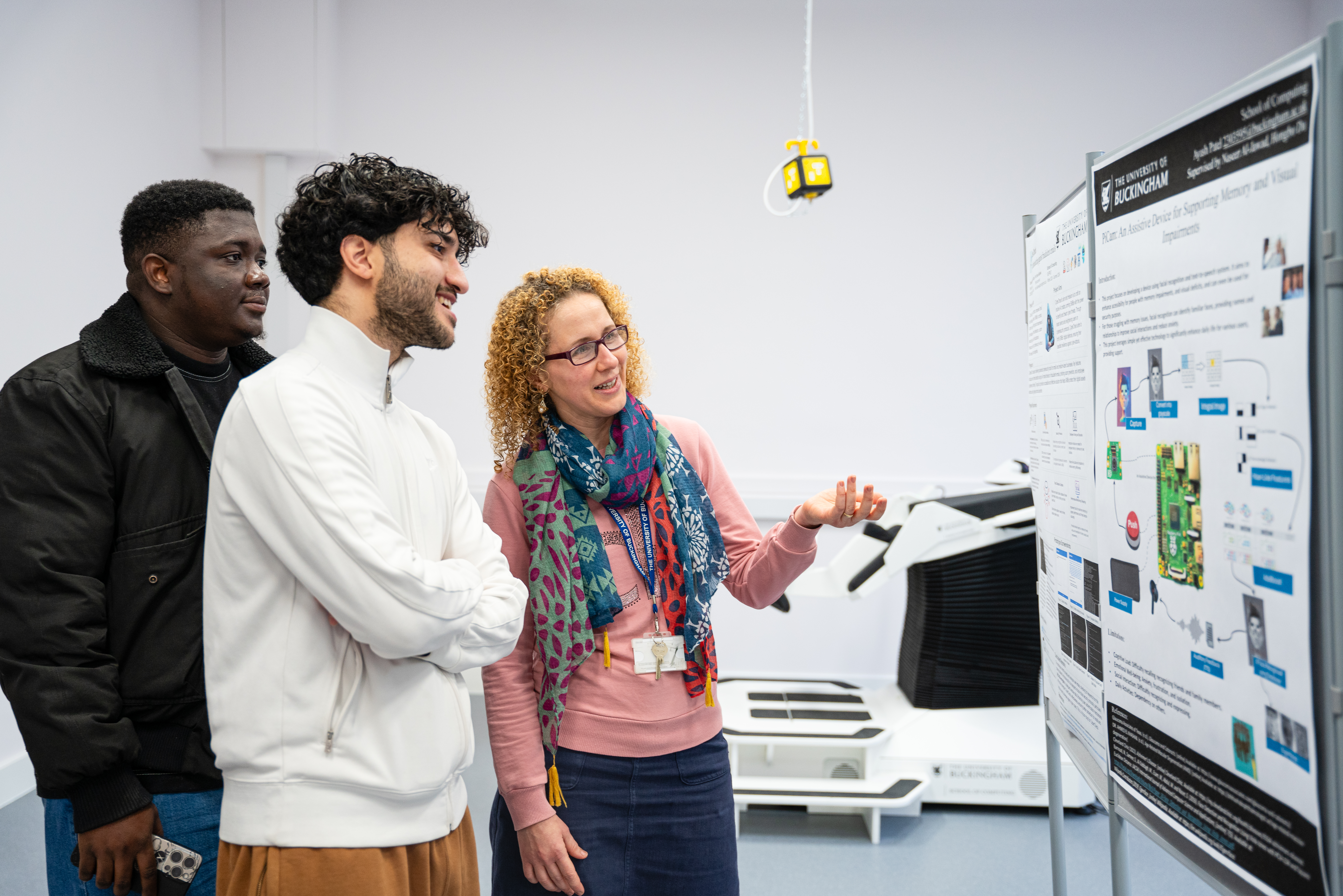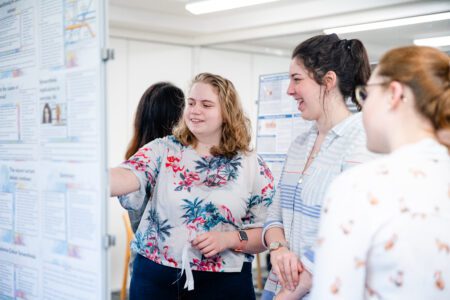Madara Premawardhana’s research is bringing clean energy planning and optimisation for a sustainable future. As a PhD in Computing student, she’s developing photovoltaic digital twins to stimulate and forecast solar energy production in real time — a tool to improve decision-making, predictive maintenance, and optimised energy output. For global regions lacking in technical resources and infrastructure, this user-friendly tool is a game-changer to a greener world.
Meanwhile, PhD candidate Cedric Nnah is battling cyber threats to what’s seemingly the world’s most loved and hated tool: artificial intelligence. As societies grow increasingly connected, adversarial attacks are flooding in by the dozen. That’s why Nnah is aiming to improve the cybersecurity infrastructure — to keep valuable information safe and secure.
These two PhD students may be tackling completely different causes, but there’s a common factor behind their solution-driven research: the School of Computing at the University of Buckingham. “[Buckingham] fosters a culture where computing is not just about innovation, but about responsible innovation, ensuring that the technologies we create serve people, improve systems, and make meaningful contributions to society,” Premawardhana says.
The School of Computing is ranked first in the UK for Teaching in the Guardian University Guide 2025 That’s because as a student here, you aren’t just strolling into classrooms absorbing codes on codes with no true purpose. Whether your research theme covers image forensics, biometrics, cybersecurity, machine learning, AI in education, health, and law — you’re equipped with skills and innovation in digital technologies to drive an improved, inclusive, and sustainable future.

Students collaborate with industry partners to bring their research ideas to fruition. Source: The University of Buckingham
A Sri Lanka upbringing to a Buckingham career
Premawardhana has always been a sustainability-focused soul. It’s the result of growing up in Sri Lanka, a South Asian country that’s vulnerable to the effects of climate change. That led her to pursue a PhD. “Choosing Buckingham for my postgraduate degree in Computer Science was a deliberate decision, drawn by its strong emphasis on applied research and the flexibility to pursue interdisciplinary work,” she says.
She was struck with a deep appreciation for the PhD in Computing programme’s dedication to diversity and inclusivity. She found a home in the community, where people from different countries with different cultures, perspectives, and research interests come together to the campus nestled in an English market town.
“This international environment creates a truly global academic, where collaboration and learning extend far beyond borders,” she says. It’s a place where every idea is embraced, and every voice is heard. Nearly 45% of postgraduate research students at the School of Computing are female. Earlier this year, the School of Computing was honoured for “Advancing Women in STEM” and titled the “Overall STEM Champion” at the MK STEM Awards 2025.
Encouraged, Premawardhana dove right into her research. In her first year, she worked as a web development intern for a project led by the Christian charity, YMCA Crewe. She developed their website to better serve people with visual, cognitive, and motor impairments, and realised how digital systems can be designed with inclusivity in mind.
This year, she participated in the UK’s national showcase of data science and artificial intelligence: Alan Turing Institute – AI UK 2025, where she presented a poster on her research on the use of digital twins for net zero transition. She received valuable feedback and even got to engage with industry leaders and researchers in workshops and discussions.
“One of the key strengths of the programme is its close alignment with industry needs and community challenges,” she says. “We are encouraged to frame our work within current global priorities, such as net zero, digital inclusion, and ethical AI.”
![“The workshops, talks, and insightful discussions [at AI UK 2025] with like-minded individuals greatly enriched my perspective on the intersection of AI, sustainability, and digital technologies,” says Madara Premawardhana.](https://studyinternational.com/wp-content/uploads/2025/05/AI-UK-2025-007-768x1024.jpg)
“The workshops, talks, and insightful discussions [at AI UK 2025] with like-minded individuals greatly enriched my perspective on the intersection of AI, sustainability, and digital technologies,” says Madara Premawardhana.
Computer Science at The University of Buckingham: Creating an inclusive and sustainable world
To transform student innovation into impact, the School of Computing has many NGOs, government bodies, and industry partners supporting the strive for change. It’s garnered up to 2.5 million pounds worth of funding over the past decade to conduct industry-based research and development in AI, agritech, biometrics, medical imaging, IoT, and security.

School of Computing students have access to industry standard technological equipment from AI tools to robotics. Source: The University of Buckingham
A curriculum that meets real-world innovation
Conducting impactful research doesn’t come without its hiccups. If you’re in search of financial support, the University of Buckingham offers a range of postgraduate scholarships, from the First-Class Scholarship — reducing tuition fees by 33% — to the Royal Charter 40th Anniversary Scholarship and Sheikh / Mubarak Abdullah Al-Mubarak Al-Sabah Scholarship (Postgraduate). Aside from programme funding, students receive support to showcase their research projects to a global audience through funding to attend conferences.
For Nnah, who’s originally from Nigeria, the biggest challenge he faced throughout his research in cybersecurity was accessing high-quality datasets and keeping up to date with emerging trends within the field. “The university provided access to GPUs to speed up the rate of processing,” he says. It keeps him ahead of industry trends too, through cutting-edge resources, workshops, and regular seminars and discussions on emerging technologies with the faculty.
“The tailored and personalised supervision by faculty members has a great impact on both the academic and social profession of the researcher,” says Nnah, who appreciates the small-sized classes at Buckingham. It’s one of the reasons he found himself attracted to the university at first, alongside its unique approach to interdisciplinary projects and real-world applications.
Thanks to Buckingham’s vast partnerships, Nnah could take his research into the real-world through collaborations with external organisations. He was able to share his research in the Northumbria ACE-CSR Cyber Security Workshop 2025, where he received constructive feedback from professionals and research experts in his field.
“My research in cybersecurity, especially in the development of robust intrusion detection systems, is critical to ensuring that individuals and organisations are protected from cyber threats,” Nnah says. If you’re looking to create that same scale of impact, then check out the postgraduate degrees at Buckingham’s School of Computing today.
Follow the University of Buckingham on Facebook, X, YouTube, LinkedIn, , and Instagram.












